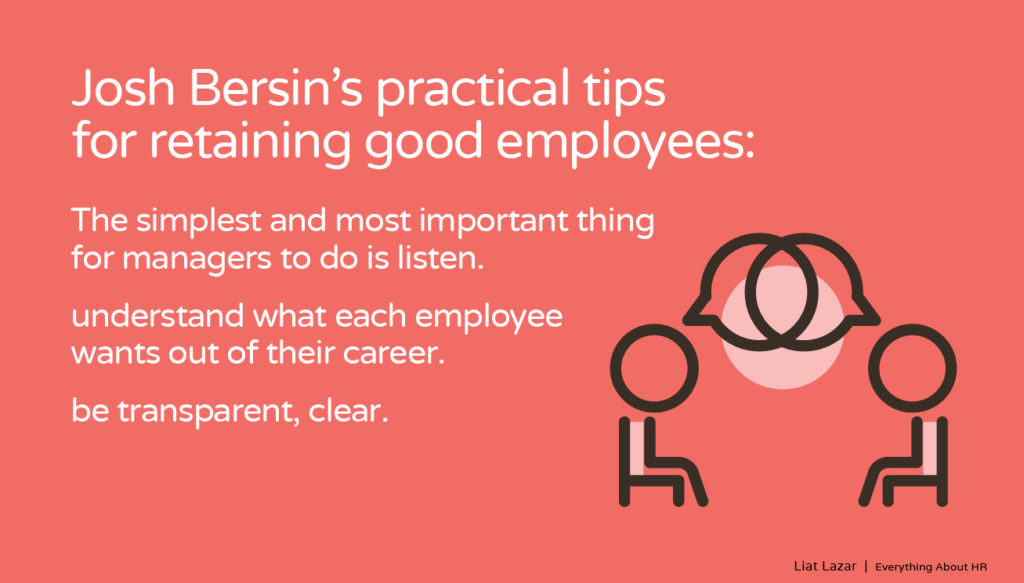הצצה לדברים שעלו במפגש של הפורום המיוחד של: Microsoft for startups, Samsung next & Linkedin. בפורום חברות מנהלות משאבי האנוש של 60 חברות הסטארטאפ ששייכות לפרוטפוליו של החברות הנ"ל.
יעל רן, נעמה ספיר ואנוכי מובילות את התכנים המקצועים. בפוסט אנחנו מביאות לכם את סיכום המפגש החמישי שעסק בחזרה לשיגרה. נושא שהוא בין המדוברים לאחרונה. המפגש התמקד בשני היבטים:
- איך החזרה למשרד נראית בעולם?
- איך זה נראה אצלנו?
חלק ראשון איך זה נראה בעולם?
שיתפנו במחקרים אותם ערך ג'וש ברסין, גורו בתחום ה- HR ואחד המרצים המבוקשים בעולם, הוא מייסד ומנכ"ל קבוצת המחקר ברסיןן, המחקרים נערכו בחודש האחרוi ומתבססים על עשרות שיחות עם מנהלי משאבי אנוש בארגונים מגוונים בעולם. ג'וש ברסין מדבר על ארבעה מרכיבים שצריך על מנת לייצור ארגון מש"א חזק וחסין שיוכל להתמודד בצורה טובה יותר עם המשבר הבא, מתוך הנחה שהמשברים הללו יקרו בתדירות גבוהה יתר מבעבר:
For HR it means a Coordinated, Distributed operating model:
1/ Resilience demands “distributed control with centralized coordination,” not “centralized control with distributed execution.”
2/ Resilience demands high quality, real-time data. The need to have employees data into real-time dashboards.
3/ Resilience requires leadership who cares. In resilient organizations is leadership who people want to follow. If you want to build resilience, you have to build on a basis of trust. And this means leaders who listen, care and respond.
4/ Resilience thrives in a community, not just an organization.-The most resilient, adaptive, and high performing companies are made up of people who know each other, like each other, and support each other
חלק שני, באיזה אופן חזרו החברות לעבודה, איך מתכננים להתנהג במשרד, מה יהיה שונה?
ערכנו פאנל שבו השתתפו 3 מחברות הפורום:
- אלה קרוטוקופ, Head of HR, Intuition Robotics
- ז'אנה ברזנר, HR Manager, Overwolf
- אריאלה ביכלר, VP HR, Elementor
להלן הנקודות המרכזיות שעלו ממשתתפות הפאנל:
אלה קרוטוקופ מ- Intuition Robotics
- "בבוקר כל אחד יצטרך למדוד חום ולשלוח הצהרה ולדווח זאת, נמנע מארוחות צהריים משתפות ואכילה משותפת,
- אסור להשתמש בכלים רגילים רק חד פעמי.
- נאבזר את המטבח פחות מבעבר ורק בדברים חיוניים,
- הפגישות יתקיימו עפ"י הנהלים של משרד הבריאותֿ,
- ההאפי האור יתבצע בצורה שונהֿ.
- התקנו מחיצות במשרד.
- מאפשרים למי שלא ירגיש בנוח להגיע למשרד בגלל בעיה בריאותית או כל סיבה אחרת, לעבוד מהבית."
ז'אנה ברזנר, Overwolf
"התחלנו לחשוב על חזרה למשרד בתחילת מאי ויצרנו גם מסמך הוראות להתנהגות במשרד בהתאם לתו הסגול.
חזרנו לעבוד מהמשרד באופן חלקי – כרגע אנחנו מאפשרים רק למי שרוצה להגיע למשרד, השאר ממשיכים לעבוד מהבית. האחריות היא בידי כל אחד, כל עובד, בין אם הוא מנהל ובין אם לא בהתאם להרגשה שלו ולאמצעי (מי שעדיין חושש, או לא רוצה לקחת תחבורה ציבורית וכו').
מי שכן מגיע, הכנו מסמך נהלים – שהוצאתי את רובו ממשרד הבריאות וכל עובד חייב לקרוא אותו לפני הגעתו למשרד.
בנוסף כל עובד חייב לעדכן באקסל נוכחות, בנוגע לכוונתו להגיע למשרד לפחות יום לפני, על מנת לעקוב ולדעת מי מגיע ולאפשר אכיפת הנחיות של עד שני עובדים בחדר.
במקביל אנחנו עובדים על מדיניות שתאפשר לעובדים לעבוד באופן קבוע מהבית. קיבלנו סיגנלים ברורים מעובדים שהם מאוד היו רוצים להמשיך את העבודה מהבית ולהפוך את זה לחלק מהשגרה. ההתלבטות שלנו היא האם לאפשר לכל אחד לבחור את הזמן המתאים לו (עד יום, יומיים בשבוע) לבין סגירה של המשרד ביום מרוכז אחד. הוצאנו שני סקרים שמדברים על יתרונות וחסרונות בעבודה מהבית ומה החשש העיקרי בחזרה למשרד.
בינתיים אנחנו בודקים מה קורה בחברות אחרות וגם פנימית מול העובדים, איך זה מתנהל כשחלק במשרד וחלק מהבית, ומה היתרונות והחסרונות."
אריאלה ביכלר, Elemtor
"באלמנטור, טרם החלטנו להחזיר את כולם למשרד.
לפני כשלושה שבועות הוצאנו סקר לכל העובדים בארץ על מנת לשמוע אותם ולראות איך הם היו רוצים לראות את החזרה.
התשובות שקיבלנו היו מגוונות, כאלו שחוששים מחזרה בגלל התחבורה הציבורית, כאלו שלא בטוחים שישלחו את הילדים למסגרות ואף כאלו שהתרגלו לעבוד מהבית וטוב להם.
כאשר נחליט להחזיר את כולם למשרד, נצטרך לעשות חלוקה של ימים בין המחלקות בכדי למנוע צפיפות, יחד עם זאת אנחנו עוברים בעוד כחודש למשרדים חדשים ששם נוכל לרווח בין כולם.
המשרד הותאם לפי תו תקן סגול מל הבחינות, הכנו הצהרת בריאות דיגיטלית, ובכל ערב העובדים צריכים לעדכן את מנהלת המשרד באם הם מתכננים להגיע.
מבחינת הוראות מיוחדות, חשוב לנו שכל אחד ישמור על מקסימום סטריליות."
לסיכום, הדברים המרכזיים שעלו מהמפגש:
- אין מדיניות מגובשת עדיין וחברות עובדות עליה בימים אלה.
- נראה שחברות יאמצו תמהיל של עבודה מהבית ומהמשרד.
- לגבי ימים קבועים לעבודה מהמשרד, גם כאן ישנה שונות התלויה בסוג החברה והנושא עדיין בבדיקה. המלצתינו, במידה ומתאפשר, יש יתרון שהחברה תתכנס לפחות שלוש פעמים בשבוע בימים קבועים.
- מאד ברור שחברות הפורום משתמשות בסקרים על מנת לקבל החלטות ולגבש מדיניות. זו כבר לא החלטת הנהלה שרירותית שיורדת לכל הארגון. השימוש בסקרים מהווה בסיס לקבלת החלטות. וזה מתחבר למגמות שרואים בעולם הקשורות לאיסוף דטה עדכני כדי לקבל החלטות.




